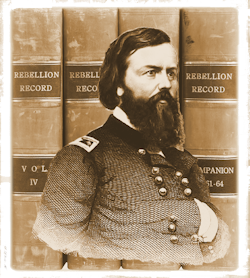February 25.—General Henry Heth and staff have arrived at Lewisburgh, Va. He takes command of the forces of Kanawha. He was greeted with great applause by the troops, many of whom were in his old command, and all knew him by reputation. Great confidence is felt in this young and talented officer, and no one could have been sent who gives so universal satisfaction.—Richmond Dispatch, February 28.
—The Savannah Republican of this date says: A reconnoissance by the steamer Savannah, yesterday, brought to light all the movements of the enemy in our river. They have erected three batteries, which effectually cut off all communication with the Fort—one of four guns, on Venus’s Point, one of the same number of guns on a small marsh, just above Long Island, and commanding the south channel, and the third on boats moored in Mud River. The three are located in the form of a triangle, and could not be passed by any vessel in our service. The guns are all of a heavy calibre, most of them throwing shot to the distance of three miles. A number were fired at the Savannah, but they all fell short.
—Major Ferdinand Lacomte formally received his appointment on Major-General McClellan’s staff. He is considered one of the most intelligent, energetic officers in the Swiss service, and is known as an author as well as a soldier. He obtained leave of absence from his own government to enter the National army.
—The city of Nashville, on the Cumberland River, capital of Tennessee, was occupied this morning by the National forces under command of General Nelson, U.S.A. No opposition was made to the landing of the troops, who had been conveyed from Clarksville by steamer. The greatest panic prevailed in the city on the announcement of the approach of the National soldiers. Large numbers of the inhabitants fled with the retreating rebel army, and a vast amount of property was wantonly destroyed by the fugitives.— (Doc. 63.)
—The Ninth Ohio and Second Minnesota regiments this afternoon received two splendid flags from the loyal ladies of Louisville, in commemoration of their victory at Mill Springs on January nineteenth. Considerable enthusiasm attended the presentation.—Louisville Journal, Feb. 26.
—An important order was issued from the War Department at Washington, in relation to the transmission of intelligence in regard to military operations. All the telegraph lines in the United States (loyal States, we presume, is meant) were taken possession of by the War Department, and all telegraphic communications in respect to military operations, not authorized by the War Department, were forbidden. Newspapers publishing military intelligence, however obtained, and by whatever medium received, not authorized by the official authority, were excluded thereafter from receiving intelligence by telegraph, or transmitting their papers by railroad.
—The rebel General Sterling Price sent an official report of his retreat from the State of Missouri, to the disloyal Governor C. F. Jackson, dated at Camp on Cove Creek, Arkansas. He states that, having occupied Springfield, Mo., for the purpose of being within reach of supplies, etc., he was attacked by superior numbers of National troops on the twelfth inst., and deemed it prudent to retreat. After a fatiguing march of over four days’ duration, with continual skirmishing with the National troops, he succeeded in reaching Cross Hollows, Arkansas, with a loss of from four to six killed and fifteen or eighteen wounded.— (Doc. 64.)











